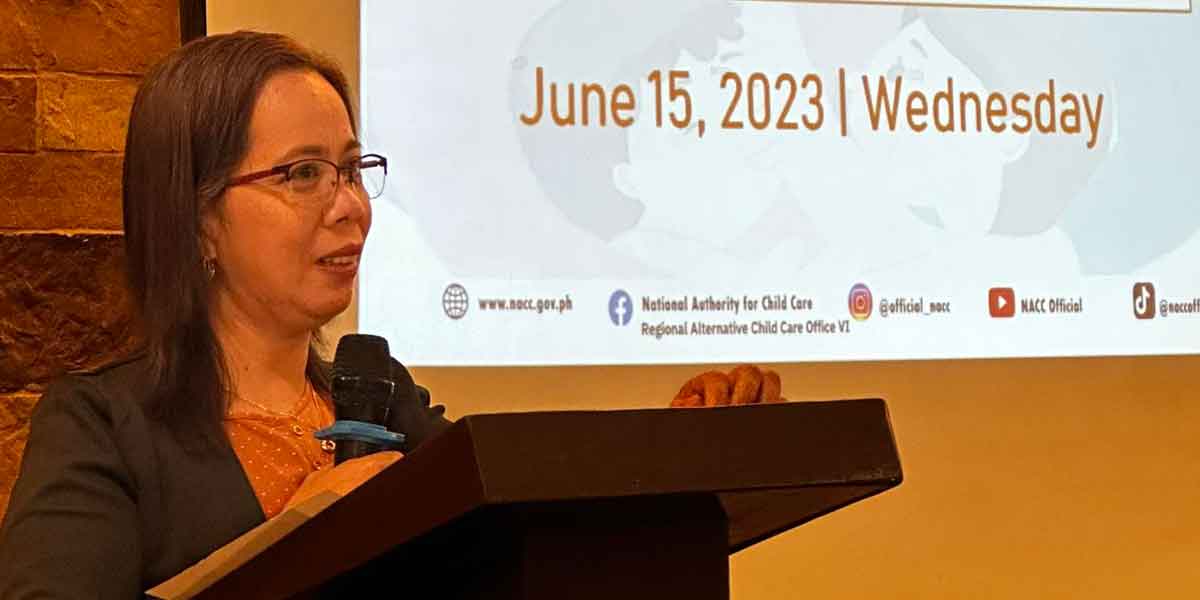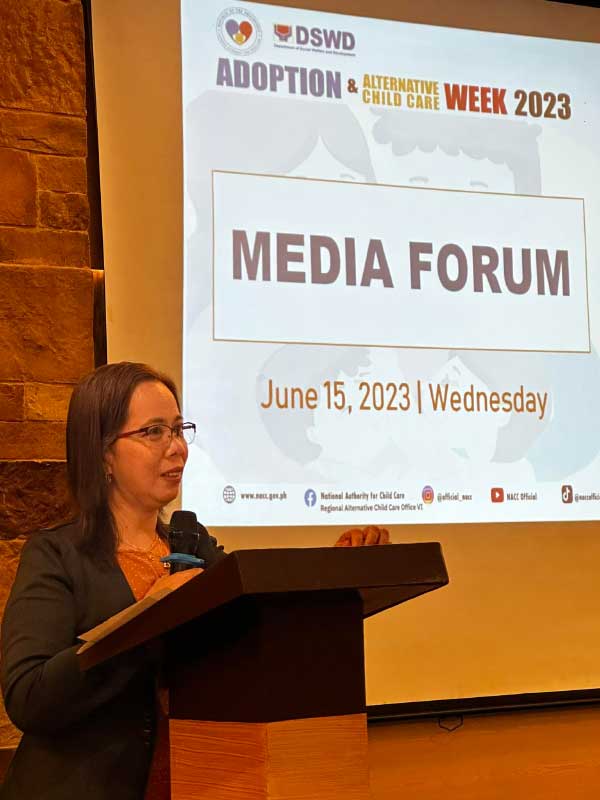

By Jennifer P. Rendon
Just like most adoptive parents, Mabel Galas-Ganancial and her husband’s adoption journey was not a walk in the park.
Ganancial, the adoptive parent of 12-year-old Ma. Althea, said they had no idea how to legally adopt a child.
At the onset, they did not have any plan to legalize the adoption of Althea.
“We were confident that even if our child is not legally adopted, she will not be taken away from us, which we realized was wrong,” she said.
Ganancial talked about how she ended up legally adopting their daughter during a media forum, which was part of the advocacy campaign in celebration of “The 2023 Adoption and Alternative Child Care Week Celebration,” on June 15, 2023.
Ganancial’s prejudice in going through the legal adoption process changed when she was introduced to Republic Act 11222 or the “Simulated Birth Rectification Act.”
The law, which took effect on March 29, 2019, allows the rectification of simulated birth records and sets the prescribed administrative adoption proceedings.
Simulation of birth record refers to the tampering of the civil registry to make it appear in the record of birth was born to a person who is not such child’s biological mother, causing the loss of the true identity and status of such child.
With the passage of the law, it granted amnesty and allowed the rectification of the simulated birth of a child. It also helped fix the status and filiation or ancestry of a child.
Most importantly, the law will exempt from criminal, civil and administrative liability those who simulated the birth record of a child prior to the effectivity of the law, provided that a petition for adoption with an application for rectification of the simulated birth record is filed within 10 years from the effectivity of R.A. 11222.
Even when Ganancial learned about RA 11222 from one of her friends, who is a government employee in Guimaras, she was still hesitant to come out “since we knew that what we have done is wrong.”
“But she encouraged us that this is our chance to correct what we have done to the birth certificate of our child,” Ganancial said.
After reading the salient points of RA 11222, she visited the Municipal Social Welfare and Development Office of Nueva Valencia, Guimaras to inquire about the adoption process under RA 11222. They also attended an adoption forum.
During the forum, Ganancial realized that adoption is not easy since their relationship to Ma. Althea is beyond 4th degree. Thus, the need for an issuance of a Certificate Declaring the Child Legally Available for Adoption (CDCLAA) first.
A CDCLA refers to the certification issued by the DSWD Secretary or his or her duly authorized representative administratively declaring that the child is legally available for adoption. It is required in all cases except in adults and adoption of relatives within the 4th degree of consanguinity or affinity.
“At that time, my husband, a seafarer, was onboard and I needed to wait for him to come home because there is a certain document that needed his signature to pursue the processing of the CDCLAA of our daughter,” she said.
Ganancial said it took them a few months before submitting the complete documents to the MSWDO of Nueva Valencia, Guimaras. They also waited a few months again until their daughter was issued with a CDCLAA.
There were a series of processes done before their documents were endorsed to the Department of Social Welfare and Development (DSWD) Central Office.
“After the challenges and patiently waiting, we finally received the Order of Adoption and Certificate of Finality in February 2023, and officially our daughter, Ma. Althea is now our legal daughter,” she said.
Ganancial said that RA 11222 has given them a chance to correct what they did to the birth certificate of our daughter.
“We are now relieved that she can now avail the same legal rights and privileges as our legitimate daughter. With RA 11222, we can finally say that our relationship with our daughter is legal and secured,” she said.
Rectification simplified
Jeannie Lyn Casiple, Regional Alternative Child Care Office (RACCO)-Region 6 focal personnel on RA 11222, said that the law provides for and allows a simpler and less costly administrative adoption proceeding.
But given the perceived practice of birth simulation, there were only a handful of adoptive parents who availed of the amnesty under RA 11222.
Of the 18 cases, fifteen were already approved while three are in process.
The agency, though, could not come up with a ballpark figure of possible children who went through simulated birth.
In several cases, parents are not even aware that simulated birth could land them in jail.
Even those who aided the simulated birth, like medical personnel, are not spared from liabilities.
“That’s why, we are asking parents who did simulated birth to avail of the law,” Casiple said.
But she noted that the child should have been living with the person/s who simulated her or his birth record for at least three years before the effectivity of the law.
“The child subject of the petition has been living with or under the custody of the petitioner/s from March 29, 2016, or earlier,” she said.
Casiple added that the simulated birth record of the child should have been done on it before March 28, 2019.
Application for Rectification of Simulated Birth Record should also be filed on or before March 29, 2029, which is the prescribed period under the Act.